- Home
- Pat Barker
The Ghost Road Page 2
The Ghost Road Read online
Page 2
Prior jerked his head at the door. ‘Who’s in?’
‘Nesbit. He’s been in thirty minutes.’
‘What’s taking so long?’
Owen hesitated, then mouthed, ‘Clap.’
Well, Prior thought, that was one way of getting out of it. And then he thought, You uncharitable bastard, how do you know he got it deliberately? And then he thought, Well, I am an uncharitable bastard.
‘I won’t take long,’ Owen said. ‘I’m GS already.’
‘Then why are you here?’
‘Irregular heartbeat. I added my name to the draft, but when I had the final medical they promptly took it off again.’
‘You added your name to the draft? Sure it’s your heart that’s wrong?’
Owen laughed, and looked away. ‘I’d just heard Sassoon was wounded. It seemed the only thing to do.’
Yes, Prior thought, it would. He remembered them at Craiglockhart: the incongruous pair, Sassoon so tall, Owen so short, the love Owen hadn’t been able, or hadn’t bothered, to disguise.
‘Also,’ Owen said, ‘I was getting pretty tired of being regarded as “a twitching Nancy boy from a loony-bin in Scotland”.’
Prior smiled. ‘I applied it to myself as well.’
Owen had cut himself shaving, he noticed. Blood in shiny brown flakes filled the crease between cheek and earlobe.
‘Do you think you’ll be all right this time?’
Owen said cheerfully, ‘Oh, yes, I should think so. I’ve been doing a lot of running.’
‘I saw.’
The door opened. Nesbit came out, looking distinctly pale.
Owen stood up. ‘Do they want me in?’
‘I don’t know.’
Owen sat down again. ‘Worse than the dentist, isn’t it?’ he said, forcing a laugh.
A few minutes later he was called in. Prior sat listening to the murmur of voices, thinking what bloody awful luck it was to have got Mather. Some MOs would send a corpse back if you propped one up in front of them, particularly now when every man was needed for the latest in a long line of ‘one last pushes’. Abruptly, before he was ready, the door opened and Owen came out. Owen started to speak and then, realizing the Board’s secretary had followed him, raised a thumb instead. From which Prior concluded that Owen’s chances of ending the year deaf, blind, dumb, paralysed, doubly incontinent, insane, brain damaged or – if he were lucky – just plain dead had enormously increased. We’re all mad here, he thought, following the secretary into the room, saluting, sitting down in the solitary chair facing the long table, meeting every eye confidently but not too confidently. And really, amidst the general insanity, was it fair to penalize a man merely because in conditions of extreme stress he tended to develop two separate personalities? You could argue the army was getting a bargain.
After the first few questions he began to relax. They were concentrating on his asthma and the risks of exposure to gas, and to those questions he had one totally convincing answer: he had been out to France three times and on none of these occasions had he been invalided back to base or home to England because of asthma. Trench fever, yes; wound, yes; shell-shock, yes. Asthma, no.
When the last question had been asked and answered, Mitchell drew the papers together in front of him, and patted them into shape. Prior watched the big white hands with their sprinkling of age spots and the shadowing of hair at the sides.
‘Right,’ Mitchell said at last. ‘I think that’s all …’
The pause was so long Prior began to wonder whether he would ever speak again.
‘Your asthma’s worse than you’re letting on, isn’t it?’ He tapped the discharge report. ‘According to this anyway.’
‘It was bad at Craiglockhart, sir. But I can honestly say it was worse there than it ever was in France.’
‘Well,’ Mitchell said. ‘Results posted this afternoon.’ He smiled briskly. ‘You won’t have long to wait.’
Two
Crude copies of Tenniel’s drawings from Alice in Wonderland decorated one end of Ward Seven, for in peacetime this had been a children’s hospital. Alice, tiny enough to swim in a sea of her own tears; Alice, unfolding like a telescope till she was nine feet tall; Alice, grown so large her arm protruded from the window; and, most strikingly, Alice with the serpent’s neck, undulating above the trees.
Behind Rivers, a creaking trolley passed from bed to bed: the patients’ breakfast dishes were being cleared away.
‘Come on, Captain McBride, drink up,’ Sister Roberts said, crackling past. ‘We’ve not got all day, you know.’
This was said loudly, for his benefit. He’d arrived on the ward too early, before they were ready for him.
‘You knew him, didn’t you?’ Elliot Smith said, coming up to him, looking over his shoulder.
Rivers looked puzzled.
‘Lewis Carroll.’
‘Oh, yes. Yes.’
‘What was he like?’
Rivers spread his hands.
‘Did you like him?’
‘I think I wanted him very much to like me. And he didn’t.’ A slight smile. ‘I’m probably the last person to ask about him.’
Elliot Smith pointed to the snake-neck. ‘That’s interesting, isn’t it?’
‘Ready now, Captain Rivers,’ Sister Roberts said. They watched her march off.
‘“Captain,”’ Elliot Smith murmured.
‘I’m in the dog house,’ Rivers said. ‘I only get “Dr” when she approves of me.’
Behind the screens Ian Moffet lay naked from the waist down. He looked defiant, nervous, full of fragile, ungrounded pride. His skin had a greenish pallor, though that might merely be the reflection of light from the green screens that surrounded his bed, creating a world, a rock pool full of secret life. Rivers pushed one screen back so that light from the window flooded in. Now Moffet’s legs, stretched out on the counterpane, were the dense grey-white of big, cheap cod. Muscles flabby but not wasted, as they would have been in a case of spinal injury, though he’d been unable to walk for more than three months, an unusually long time for hysterical paralysis to persist.
The history was, in one sense, simple. Moffet had fallen down in a ‘fainting fit’ while on his way to the Front, shortly after hearing the guns for the first time. When he recovered consciousness he could not move his legs.
‘It was ridiculous to expect me to go to the Front,’ he’d said in their first interview. ‘I can’t stand noise. I’ve never been able to stay in the same room as a champagne cork popping.’
You poor blighter, Rivers had thought, startled out of compassion. More than any other patient Moffet brought the words ‘Pull yourself together, man’ to the brink of his lips.
‘Why didn’t you apply for exemption?’ he’d asked instead.
Moffet had looked at him as if he’d just been accused of eating peas from a knife. ‘One is not a pacifist.’
He’d tried everything with Moffet. No, he hadn’t. He’d not, for example, tried attaching electrodes to Moffet’s legs and throwing the switch, as Dr Yealland would certainly have done by now. He’d not held tubes of radium against his skin till it burnt. He’d not given him subcutaneous injections of ether. All these things were being done to get men back to the Front or keep them there. He’d not even hypnotized him. What he’d actually tried was reason. He didn’t like what he was going to do now, but it had become apparent that, until Moffet’s reliance on the physical symptom was broken, no more rational approach stood any chance of working.
‘You understand what I’m going to do?’ he asked.
‘I know what you’re going to do.’
Rivers smiled. ‘Tell me, then.’
‘Well, as far as I can make out, you … er … intend to draw …’ Minute muscles twitched round Moffet’s nose and lips, giving him the look of a supercilious rabbit. ‘Stocking tops? On my legs, here.’ With delicately pointed fingers he traced two lines across the tops of his thighs. ‘And then, gradually, day by day, you prop
ose to … um … lower the stockings, and as the stockings are unrolled, so to speak, the … er … paralysis will …’ A positive orgy of twitching. ‘Retreat.’
‘That’s right.’
Moffet’s voice drooled contempt. ‘And you have no doubt this procedure will work?’
Rivers looked into the pupils of his eyes so intently that for a moment he registered no colour except black. ‘None whatsoever.’
Moffet stared at him, then turned away.
‘Shall we get started?’ Rivers lifted Moffet’s left leg and began to draw a thick black line on to his skin, two inches below the fold of the groin.
‘I hope that’s not indelible.’
‘Of course it’s not. I’m going to have to wash it off in the morning.’
Rivers looked at the length of Moffet’s legs and tried to calculate how long it was going to take him to reach the toes. Two weeks? And that would have to include Sundays, which put paid to his plans for a weekend in Ramsgate with his sisters. Katharine was far from well; in fact she was virtually bedridden and for much the same reasons as Moffet. Rivers frowned with concentration as he carried the pencil line under the thigh. Moffet’s flabby skin kept snagging the pencil point.
Elliot Smith’s comment on the serpent: ‘That’s interesting.’ It was no more than he’d thought himself. Evidently snakes had lost the right to be simply snakes. Dodgson had hated them, a quite exceptionally intense hatred, and the woods round Knowles Bank were full of them, particularly in spring when you regularly stumbled across knots of adders, as many as thirty or forty sometimes, drowsy from their winter sleep. They’d gone for a walk once, the whole family, Ethel and Katharine holding Dodgson’s hands, himself and Charles trailing behind, imitating his rather prissy, constipated-hen walk, though careful not to let their father catch them at it. They rounded a bend, Dodgson and the girls leading, and there, right in the centre of the path, was a snake. Zigzag markings, black on yellow, orange eyes, forked tongue flickering out of that wide, cynical (anthropomorphic rubbish) mouth. Dodgson went white. He sat down, collapsed rather, on a tree stump and the girls fanned him with their hats, while father caught the snake in a cleft stick and threw it far away, a black s against the sky unravelling as it fell.
Later he went back to look for it, spending an hour searching through the flamy bracken, but only found a cast-off skin draped over a stone, transparent, the brilliant markings faded, the ghost of a snake.
Why was the devil shown in the form of a snake? he asked his father, because it was the only question he knew how to ask.
Later there’d been other questions, other ways of finding answers. Once, while he was home for the weekend, Katharine sat on an adder, and ran home screaming. He’d gone straight out and killed it, or so he thought, intending to dissect it at Bart’s. Finding the family in the drawing-room, he’d tipped the snake out on to the hearthrug to show them, and found himself confronted by an adder that was very far from dead. The girls screamed and hid behind the sofa, while he and his father and Charles trampled it to death.
How do you think about an incident like that now? he wondered, beginning the second circle. Probably every generation thinks the world of its youth has been changed past recognition, but he thought for his generation – Moffet’s too, of course – the task of making meaningful connections was quite unusually difficult. A good deal of innocence had been lost in recent years. Not all of it on battlefields.
He lowered Moffet’s leg and walked round the bed. From here he could see, through a gap in the screens, the drawings of Alice. Suddenly, with Moffet’s paralysed leg clamped to his side as he closed the circle, Rivers saw the drawings not as an irrelevance, left over from the days when this had been a children’s ward, but as cruelly, savagely appropriate. All those bodily transformations causing all those problems. But they solved them too. Alice in Hysterialand.
‘There,’ he said, putting the leg down. ‘Now can you prop yourself up a bit?’
Moffet raised himself on to his elbows and looked down at his legs. ‘Quite apart from anything else,’ he said, enunciating each word distinctly, ‘it looks bloody obscene.’
Rivers looked down. ‘Ye-es,’ he agreed. ‘But it won’t when we get below the knee. And tomorrow the sensation in this area’ – he measured it out with his forefingers – ‘will be normal.’
Their eyes met. Moffet would have liked to deny it was possible, but his gaze shifted. He’d already begun to invest the circles with power.
Rivers touched his shoulder. ‘See you tomorrow morning,’ he said.
Quickly, he ran downstairs and plunged into the warren of corridors, wondering if he’d have time to read the files on the new patients before the first of them arrived for his appointment. He glanced at his watch, and something about the action tweaked his memory. Now that would be ‘interesting’, he thought. An innocent young boy becomes aware that he is the object of an adult’s abnormal affection. Put bluntly, the Rev. Charles Do-do-do-do-Dodgson can’t keep his hands off him, but – thanks to that gentleman’s formidable conscience – nothing untoward occurs. The years pass, puberty arrives, friendship fades. In the adult life of that child no abnormality appears, except perhaps for a certain difficulty in integrating the sexual drive with the rest of the personality (What do you mean ‘perhaps’? he asked himself), until, in middle age, the patient begins to suffer from the delusion that he is turning into an extremely large, eccentrically dressed white rabbit, forever running down corridors consulting its watch. What a case history. Pity it didn’t happen, he thought, pushing the door of his consulting-room open, it would account for quite a lot.
He thought, sometimes, he understood Katharine’s childhood better than his own.
Cheshire Cat! Cheshire Cat! he and Charles had chanted as she sat enthroned in Dodgson’s lap, grinning from ear to ear. The nickname, so casually bestowed, had lasted all her childhood, and his only consolation was she hadn’t minded it a bit. Poor Kath, she’d had little enough to smile about since.
Files, he told himself. He took them out of his briefcase and started to read. Geoffrey Wansbeck, twenty-two years old. Wansbeck had – well, murdered, he supposed the word would have to be – a German prisoner, for no better reason (Wansbeck said) than that he was feeling tired and irritable and resented having to escort the man back from the line. For … eight months – in fact, nearer ten – he’d experienced no remorse, but then, while in hospital recovering from a minor wound, he’d started to suffer from hypnagogic hallucinations in which he would wake suddenly to find the dead German standing by his bed. Always, accompanying the visual hallucination, would be the reek of decomposition. After a few weeks the olfactory hallucination began to occur independently, only now the smell seemed to emanate from Wansbeck himself. He was convinced others could smell it and, no matter how often he was reassured, avoided close contact with other people as much as he could.
Hmm. Rivers took off his glasses and rubbed his eyes, swinging his chair round to face the window. He’d had a bad night and was finding it difficult to concentrate. Late August sunlight, the colour of cider, streamed into the room, and he was suddenly seized by sadness, a banal, calendar-dictated sadness, for the past summer and all the summers that were past.
At dinner one evening Mr Dodgson had leant across to mother and said, ‘I l-l-l-love all ch-ch-ch-ch-’
‘Train won’t start,’ Charles had whispered.
‘Children, M-Mrs R-Rivers, as l-l-l-long as they’re g-g-g-girls.’
He had looked down the table at the two boys, and it had seemed to Rivers that the sheer force of his animosity had loosened his tongue.
‘Boys are a mistake.’
Charles hadn’t minded that Mr Dodgson disliked them, but he had. Mr Dodgson was the first adult he’d met who stammered as badly as he did himself, and the rejection hurt.
‘Are w-we a m-m-m-m-mistake?’ he’d asked his mother at bedtime. ‘W-why are w-we?’
‘Of course you’re not a mistake
,’ his mother had said, smoothing the hair back from his forehead.
‘So w-why d-d-does h-he s-say w-w-w-w-we are?’
‘I expect he just likes girls more than boys.’
‘B-b-b-b-but w-w-why d-d-does he?’
Wansbeck’s eyes were inflamed, whether from crying or because of his cold was difficult to tell.
Rivers waited for the latest paroxysm of coughing to pass. ‘You know we don’t have to do this now. I can equally well see you when you’re feeling better.’
Wansbeck wiped his raw nose on the back of his hand. ‘No, I’d rather get it over with.’ He shifted in his seat, flicking his tongue over cracked lips, and gazed fretfully round the room. ‘Do you think we could have the window open?’
Rivers looked surprised – in spite of the sunshine, the wind was bitingly cold – but he got up and opened the window, realizing, as he did so, that Wansbeck’s request was prompted by his fear of the smell. The breeze sucked the net curtains through the gap. Rivers went back to his chair and waited.
‘I used a bayonet I found on a corpse. We were going through a wood, and there’d been a lot of heavy fighting. I remember the man I took it from, he’d died with an expression of absolute agony on his face. Big man, very dark, lot of blood round his nose, black, covered with flies, a sort of … buzzing moustache. I remember him better than the man I killed. He was walking ahead of me, I couldn’t do it in his back, so I shouted at him to turn round. He knew straight away. I stuck it in, and he screamed, and … I pulled it out, and stuck it in. And again. And again. He was on the ground and it was easier. He kept saying, “Bitte, Bitte,” and putting his hands …’ Wansbeck raised his own, palms outwards. ‘The odd thing was I heard it in English. Bitter, bitter. I knew the word, but I didn’t register what it meant.’
‘Would it have made a difference?’
A puckering of the lips.
‘What were you thinking about immediately before you picked up the bayonet?’
‘Nothing.’

 Border Crossing
Border Crossing The Silence of the Girls
The Silence of the Girls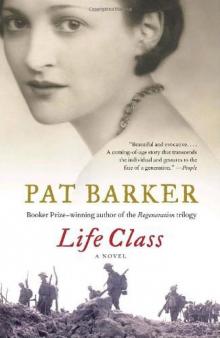 Life Class
Life Class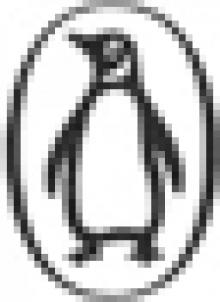 Regeneration
Regeneration Another World
Another World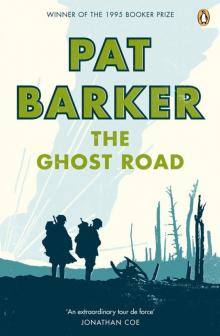 The Ghost Road
The Ghost Road Double Vision
Double Vision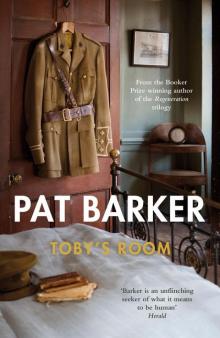 Toby's Room
Toby's Room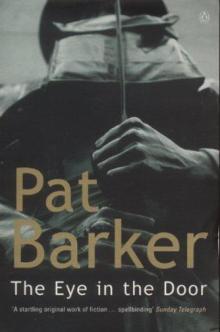 Regeneration Trilogy 02 - The Eye in the Door
Regeneration Trilogy 02 - The Eye in the Door The Eye in the Door
The Eye in the Door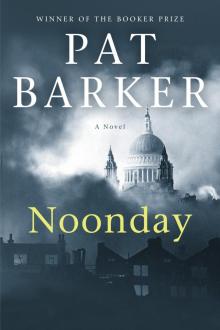 Noonday
Noonday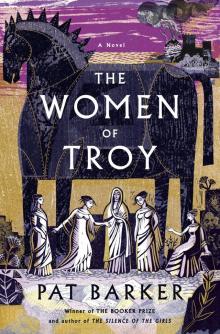 The Women of Troy: A Novel
The Women of Troy: A Novel